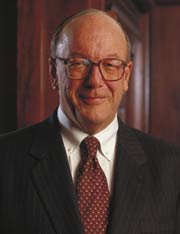It wasn’t Lewis Platt. Lewis Platt, WG’66, has had a CEO’s view of Hewlett-Packard, a director’s seat at 7-Eleven, and a high profile post atop of one of the most controversial institutions of international commerce: the World Trade Organization.
A former colleague calls the Wharton alumnus a quick study with a personal touch.
“He has an inquiring mind, a deep sense of community, and a touching humility, being not afraid to show his emotions,” says John Grant, who served with Platt at Kendall- Jackson Wine Estates during the Wharton MBA’s brief detour leading that small, privately run company.
Now Platt has returned to the corporate big-time, helping steer a huge publicly traded company. He’s back in the spotlight, some would say back in the hot seat, this time as non-executive chairman of a recovering American icon: The Boeing Company.
Given Boeing’s recent turmoil, it’s a job some would envy, and some would not. The company’s earnings are down, but its stock price is steadily up. It has shed some 4,000 commercial jobs in recent years, but is now hiring. “I think we’ve made a lot of progress,” Platt says of the struggles he has helped Boeing through over the past year and a half.
Platt certainly has experience taking companies in new directions. One of his last projects at Hewlett-Packard was to spin off Agilent Technologies, a landmark decision since splitting a successful company in two ran counter to the mergers and acquisitions craze of the time. The move divided Hewlett-Packard’s computer and printing business from the measurement business responsible for products such as semiconductor testing devices. The split become a model for other corporate divorces.
As if his glass wasn’t already full at Boeing, Platt is also continuing his high-profile Wharton roles as an overseer and as chairman of the Alumni Advisory Board supporting Wharton West, Wharton’s first-ever permanent, out-of-state satellite location. Conceived to support connections with some 8,000 Wharton alumni in the Western U.S. and more than 3,600 in Asia, the San Francisco campus allows access to academic programs and research to thousands of potential new students. “It’s time to give something back,” Platt says. “I’m very proud of the fact that we’ve established a successful campus out here.”


























